
“I think we ought to read only the kind of books that wound or stab us. If the book we're reading doesn't wake us up with a blow to the head, what are we reading for? A book must be the axe for the frozen sea within us.” The above mentioned lines were said by one of the greatest writers in the world, Franz Kafka. While we choose books, this sagacious advice should always be kept in mind. Because it is only after developing such intellectual audacity to challenge our cherished ideas, belief and concepts that we can truly seek knowledge and practice it.
Below are 5 of my best reads that forced me to re-think what I already knew and in certain cases introduced me to completely new concepts and ideas.
Radical Markets by Glen Weyl and Eric Posner
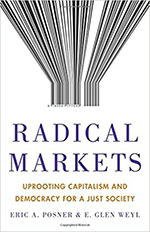 There is a reason for mentioning this book at the very top. It deserves this. The writers address some of the classic issues like the ownership of private property, the flaws in democracy, unbridled power of institutional investors and finally populism and immigration. Pointing out the “monopoly problem” in private property they give an utterly new concept of COST –Common Ownership Self-assessed Tax. To address immigration and quell growing xenophobic attitudes, an idea of VIP – Visas for Individual Program is introduced. Finally, to solve the shortcomings in democracy such as “majoritarian cycling”, the writers put forth a comprehensive system of Quadratic Voting giving us an alternative to the commonly practiced 1person 1vote (IpIv).
There is a reason for mentioning this book at the very top. It deserves this. The writers address some of the classic issues like the ownership of private property, the flaws in democracy, unbridled power of institutional investors and finally populism and immigration. Pointing out the “monopoly problem” in private property they give an utterly new concept of COST –Common Ownership Self-assessed Tax. To address immigration and quell growing xenophobic attitudes, an idea of VIP – Visas for Individual Program is introduced. Finally, to solve the shortcomings in democracy such as “majoritarian cycling”, the writers put forth a comprehensive system of Quadratic Voting giving us an alternative to the commonly practiced 1person 1vote (IpIv).
The book is a must read for policymakers who wish to see a more just and peaceful world in future.
Silk Roads by Peter Frankopan
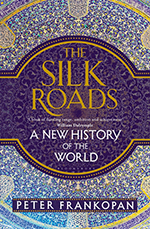 This became an instant success. The erudite Oxford historian, Frankopan, embarks on the ancient Silk Roads tracing their origin as they traverse deserts and teetered mountains bringing in not only trade and gods, but new ideas, religions and diseases. The thesis of the books is to highlight the highly significant and prominent role the ancient East played in the world. Many of us and Westerners especially are negligent of the contributions that the regions of South Asia, East Asia and South East Asia have made in the fields of trade, diplomacy, science and education.
This became an instant success. The erudite Oxford historian, Frankopan, embarks on the ancient Silk Roads tracing their origin as they traverse deserts and teetered mountains bringing in not only trade and gods, but new ideas, religions and diseases. The thesis of the books is to highlight the highly significant and prominent role the ancient East played in the world. Many of us and Westerners especially are negligent of the contributions that the regions of South Asia, East Asia and South East Asia have made in the fields of trade, diplomacy, science and education.
The writer concludes stating that it is time that this region once again assumes its historical role and lead the world.
When China Rules the World by Martin Jacques
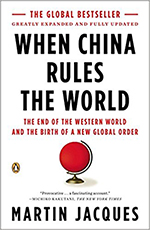 Chinese is the least understood nation in the world. A society founded on the precepts of Confucian thought cherishing uncanny familial values, China is a civilization steeped in 3,000 years of rich and unique culture. In this book, Martin Jacques explains how and why China is different from other countries around the world. He plays with the idea that when China becomes a super-power how different the international order can become.
Chinese is the least understood nation in the world. A society founded on the precepts of Confucian thought cherishing uncanny familial values, China is a civilization steeped in 3,000 years of rich and unique culture. In this book, Martin Jacques explains how and why China is different from other countries around the world. He plays with the idea that when China becomes a super-power how different the international order can become.
Besides history, economics and diplomacy, Jacques also urges the reader to indulge into Chinese food, its family culture, the education system and their peculiar beliefs (for e.g., Feng-Shui) and rituals.
Tipping Point by Malcolm Gladwell
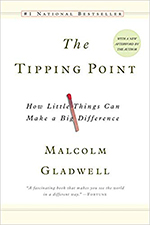 If you are planning to launch your own clothing brand, opening a restaurant, introducing a new idea to the world or anything that you want to become famous, successful and always remembered for then this is the book for you. Malcolm Gladwell gives us three principles that we need to work on if we want any idea, initiative, product, concept, news etcetera to become a success: Law of the Few, The Stickiness Factor and The Power of Context.
If you are planning to launch your own clothing brand, opening a restaurant, introducing a new idea to the world or anything that you want to become famous, successful and always remembered for then this is the book for you. Malcolm Gladwell gives us three principles that we need to work on if we want any idea, initiative, product, concept, news etcetera to become a success: Law of the Few, The Stickiness Factor and The Power of Context.
Supporting his argument while citing nail-biting stories and scenarios that seem to resemble a Hollywood movie plot the book holds the reader’s attention till the very last page.
Return of Marco Polo’s World by Robert Kaplan
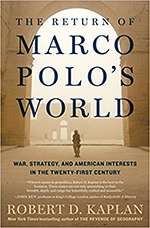 Robert Kaplan has been twice mentioned in the list of Top 100 Global Thinkers by Foreign Policy magazine. His incisive acumen is peerless when it comes to geopolitics and diplomacy. Published in 2018 his book Return of Marco Polo’s World is a collection of essays on an array of topics ranging from Vietnam War to Realpolitik and warfare to geopolitics. The book although consisting of old essays gives the reader a certain sense of cohesion and insight and especially reading it in 2018, in combination with the contemporary status of international relations, is a great experience.
Robert Kaplan has been twice mentioned in the list of Top 100 Global Thinkers by Foreign Policy magazine. His incisive acumen is peerless when it comes to geopolitics and diplomacy. Published in 2018 his book Return of Marco Polo’s World is a collection of essays on an array of topics ranging from Vietnam War to Realpolitik and warfare to geopolitics. The book although consisting of old essays gives the reader a certain sense of cohesion and insight and especially reading it in 2018, in combination with the contemporary status of international relations, is a great experience.
Below are 5 of my best reads that forced me to re-think what I already knew and in certain cases introduced me to completely new concepts and ideas.
Radical Markets by Glen Weyl and Eric Posner
 There is a reason for mentioning this book at the very top. It deserves this. The writers address some of the classic issues like the ownership of private property, the flaws in democracy, unbridled power of institutional investors and finally populism and immigration. Pointing out the “monopoly problem” in private property they give an utterly new concept of COST –Common Ownership Self-assessed Tax. To address immigration and quell growing xenophobic attitudes, an idea of VIP – Visas for Individual Program is introduced. Finally, to solve the shortcomings in democracy such as “majoritarian cycling”, the writers put forth a comprehensive system of Quadratic Voting giving us an alternative to the commonly practiced 1person 1vote (IpIv).
There is a reason for mentioning this book at the very top. It deserves this. The writers address some of the classic issues like the ownership of private property, the flaws in democracy, unbridled power of institutional investors and finally populism and immigration. Pointing out the “monopoly problem” in private property they give an utterly new concept of COST –Common Ownership Self-assessed Tax. To address immigration and quell growing xenophobic attitudes, an idea of VIP – Visas for Individual Program is introduced. Finally, to solve the shortcomings in democracy such as “majoritarian cycling”, the writers put forth a comprehensive system of Quadratic Voting giving us an alternative to the commonly practiced 1person 1vote (IpIv).The book is a must read for policymakers who wish to see a more just and peaceful world in future.
Silk Roads by Peter Frankopan
 This became an instant success. The erudite Oxford historian, Frankopan, embarks on the ancient Silk Roads tracing their origin as they traverse deserts and teetered mountains bringing in not only trade and gods, but new ideas, religions and diseases. The thesis of the books is to highlight the highly significant and prominent role the ancient East played in the world. Many of us and Westerners especially are negligent of the contributions that the regions of South Asia, East Asia and South East Asia have made in the fields of trade, diplomacy, science and education.
This became an instant success. The erudite Oxford historian, Frankopan, embarks on the ancient Silk Roads tracing their origin as they traverse deserts and teetered mountains bringing in not only trade and gods, but new ideas, religions and diseases. The thesis of the books is to highlight the highly significant and prominent role the ancient East played in the world. Many of us and Westerners especially are negligent of the contributions that the regions of South Asia, East Asia and South East Asia have made in the fields of trade, diplomacy, science and education.The writer concludes stating that it is time that this region once again assumes its historical role and lead the world.
When China Rules the World by Martin Jacques
 Chinese is the least understood nation in the world. A society founded on the precepts of Confucian thought cherishing uncanny familial values, China is a civilization steeped in 3,000 years of rich and unique culture. In this book, Martin Jacques explains how and why China is different from other countries around the world. He plays with the idea that when China becomes a super-power how different the international order can become.
Chinese is the least understood nation in the world. A society founded on the precepts of Confucian thought cherishing uncanny familial values, China is a civilization steeped in 3,000 years of rich and unique culture. In this book, Martin Jacques explains how and why China is different from other countries around the world. He plays with the idea that when China becomes a super-power how different the international order can become.Besides history, economics and diplomacy, Jacques also urges the reader to indulge into Chinese food, its family culture, the education system and their peculiar beliefs (for e.g., Feng-Shui) and rituals.
Tipping Point by Malcolm Gladwell
 If you are planning to launch your own clothing brand, opening a restaurant, introducing a new idea to the world or anything that you want to become famous, successful and always remembered for then this is the book for you. Malcolm Gladwell gives us three principles that we need to work on if we want any idea, initiative, product, concept, news etcetera to become a success: Law of the Few, The Stickiness Factor and The Power of Context.
If you are planning to launch your own clothing brand, opening a restaurant, introducing a new idea to the world or anything that you want to become famous, successful and always remembered for then this is the book for you. Malcolm Gladwell gives us three principles that we need to work on if we want any idea, initiative, product, concept, news etcetera to become a success: Law of the Few, The Stickiness Factor and The Power of Context.Supporting his argument while citing nail-biting stories and scenarios that seem to resemble a Hollywood movie plot the book holds the reader’s attention till the very last page.
Return of Marco Polo’s World by Robert Kaplan
 Robert Kaplan has been twice mentioned in the list of Top 100 Global Thinkers by Foreign Policy magazine. His incisive acumen is peerless when it comes to geopolitics and diplomacy. Published in 2018 his book Return of Marco Polo’s World is a collection of essays on an array of topics ranging from Vietnam War to Realpolitik and warfare to geopolitics. The book although consisting of old essays gives the reader a certain sense of cohesion and insight and especially reading it in 2018, in combination with the contemporary status of international relations, is a great experience.
Robert Kaplan has been twice mentioned in the list of Top 100 Global Thinkers by Foreign Policy magazine. His incisive acumen is peerless when it comes to geopolitics and diplomacy. Published in 2018 his book Return of Marco Polo’s World is a collection of essays on an array of topics ranging from Vietnam War to Realpolitik and warfare to geopolitics. The book although consisting of old essays gives the reader a certain sense of cohesion and insight and especially reading it in 2018, in combination with the contemporary status of international relations, is a great experience. 